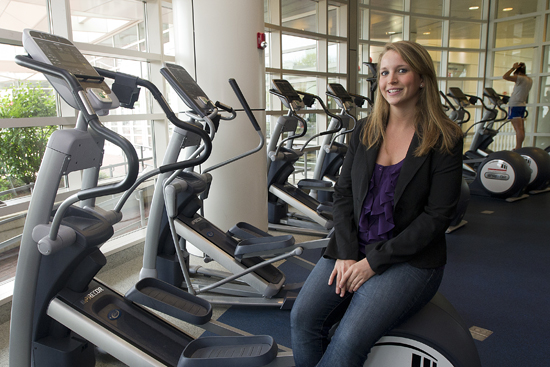Powering FitRec, One Workout at a Time
CAS alum’s idea could one day provide energy source

Amy Bryson had what she calls some heavy-hearted days last spring while she was studying abroad. Traveling to India, China, and South Africa, the international relations major visited villages that had none of the basics people in developed nations take for granted. No running water, no proper sanitation, and in some places, no food crops because of harsh swings in the weather.
Instead of brooding, Bryson (CAS’11) and her friends had designated brainstorming days, where they would sit around and concoct three “silly solutions” to world problems. One idea they came up with was using gyms as power sources.
“We would make every human in the United States a little hamster and power the world,” Bryson recalls saying.
What began as a joke is a concept Bryson now takes seriously. After returning to BU, she proposed using technology to harness human energy at BU’s Fitness & Recreation Center for a project in her Environmentally Sustainable Development class, taught by Anne Short, a College of Arts & Sciences assistant professor of geography and environment. Her project was among 60 presented during the class’s poster session several weeks ago. Although the idea proved not to be financially feasible for now, it could still be used as a tool to educate FitRec members about energy use and generation, says Dennis Carlberg, the University’s sustainability director, who reviewed Bryson’s proposal.
“This is one of the things I want to talk about with the Sustainability Steering Committee,” says Carlberg. “I think it has some interesting caché. Not many universities are doing this.”
Bryson immersed herself in research to determine the practicality of her idea. She collected data on FitRec’s energy consumption and expenses, monitored gym equipment use at high and low points during the week, spoke with industry representatives for estimates on equipment BU could buy to harness human energy, and surveyed 400 friends on the topic via Facebook.
Several companies, like PlugOut and Human Dynamo, make stationary bikes that convert kinetic energy from exercise directly into current that can be rerouted into a building’s electrical grid. But the University would have to purchase new bikes to replace existing equipment, Bryson says.
A company called ReRev provides a more viable option. It makes a device that attaches to Precor elliptical machines to convert workout energy into renewable electricity. BU has 52 such machines, which are popular with members.
Small gyms and universities (from Oregon to South Carolina and Ohio to Texas) have already adopted ReRev’s technology, yet convincing BU to join the trend could be a hard sell.
By Bryson’s estimates, even if FitRec retrofitted all its Precor ellipticals and members used them every hour of every day the gym was open, the most energy the machines would harness annually is 25,972 kilowatt hours. That’s a savings of just $3,376 a year, or about 0.3 percent of FitRec’s yearly energy bill. A more realistic estimate puts savings between $800 and $1,750 a year.
Retrofitting every Precor elliptical with ReRev equipment would cost at least $41,000, based on a company estimate. That means more than two decades would pass before the machines paid for themselves.
“This is probably not the most financially viable project we could get ourselves into,” Bryson acknowledges. But she thinks much more can be done to make equipment currently on the market more efficient and cheaper to install.
But “numbers and money aren’t the only things that matter on this project,” she says. Investing in technology like ReRev’s, despite the cost, would send a symbolic message that BU places a “huge emphasis” on energy education and social awareness.
Carlberg agrees, but says an investment like retrofitting FitRec machines is not a top priority. “There are other things that have paybacks on shorter time frames and a bigger impact when you look only at the numbers,” he says. Installing solar panels or wind turbines comes to mind. That said, Carlberg says he can see FitRec members taking ownership of a workout if they knew it would generate energy for the gym. “I think there’s a lot to be gained by this.”
Whatever BU decides to do, it will have to be without Bryson. The new alum has been admitted to a graduate program at the University of North Carolina at Chapel Hill. Her field of study? Public health.
Leslie Friday can be reached at lfriday@bu.edu; follow her on Twitter at @lesliefriday.
Comments & Discussion
Boston University moderates comments to facilitate an informed, substantive, civil conversation. Abusive, profane, self-promotional, misleading, incoherent or off-topic comments will be rejected. Moderators are staffed during regular business hours (EST) and can only accept comments written in English. Statistics or facts must include a citation or a link to the citation.